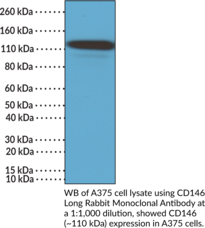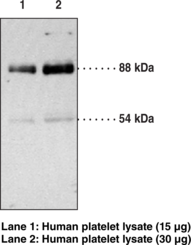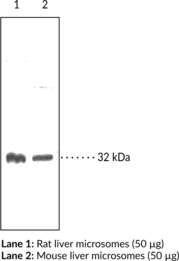Description
CD146, also known as the melanoma cell adhesion molecule (MCAM), is an adhesion molecule and type 1 transmembrane glycoprotein with roles in vascular homeostasis, cell migration, and neuronal differentiation and is encoded by MCAM in humans.{58076,58077} It is comprised of a signal sequence, an extracellular domain containing five immunoglobulin-like (Ig-like) domains, a hydrophobic transmembrane domain, and a cytosolic domain composed of an ezrin, radixin, moesin (ERM) protein complex binding motif and a double leucine motif for epithelial basolateral targeting. Alternative splicing of MCAM produces two isoforms that differ in length of their cytosolic domain, CD146 short (shCD146) and CD146 long (lgCD146), that contain one or two protein kinase C (PKC) phosphorylation sites, respectively.{58078} LgCD146 is expressed on endothelial cells, smooth muscle cells (SMCs), and pericytes where it is localized to tight junctions, as well as in mononuclear cells, mesenchymal stromal cells, and trophoblasts.{58076} It induces stabilization of capillary-like structures in a Matrigel™ assay. Cayman’s CD146 Long Rabbit Monoclonal Antibody can be used for immunohistochemistry (IHC) and Western blot (WB) applications.
Synonyms: CD146-L|LgCD146|MCAM-1|MUC18
Immunogen: Synthetic peptide corresponding to the C-terminal region of human lgCD146
Formulation: 100 µl of protein A-affinity purified monoclonal antibody
Isotype: IgG
Applications: IHC, WB
Origin:
Stability: 365 days
Application|Immunohistochemistry||Application|Western Blot||Product Type|Antibodies|Monoclonal Antibodies||Research Area|Cardiovascular System|Vasculature|Endothelium||Research Area|Cardiovascular System|Vasculature|Smooth Muscle Cells||Research Area|Cell Biology|ECM & Adhesion Molecules||Research Area|Immunology & Inflammation|Innate Immunity||Research Area|Neuroscience



